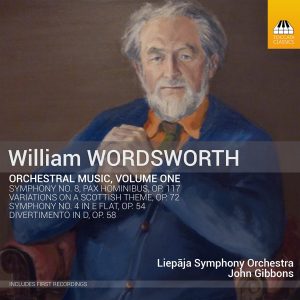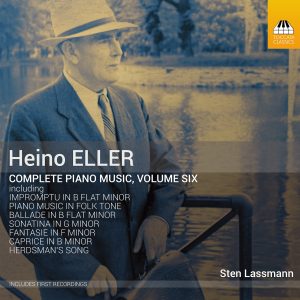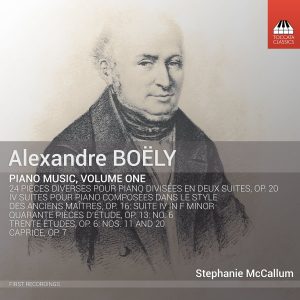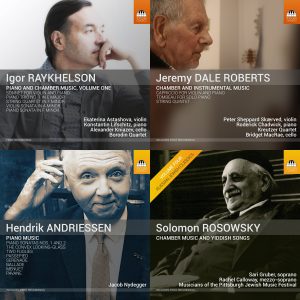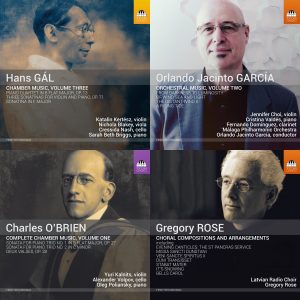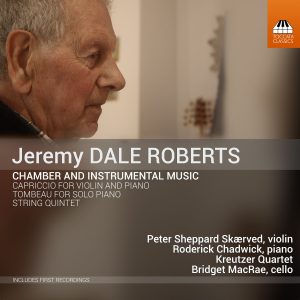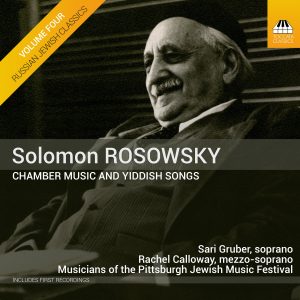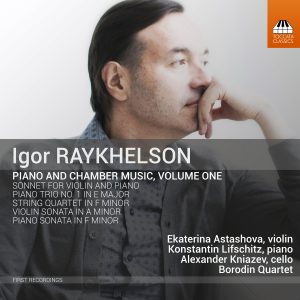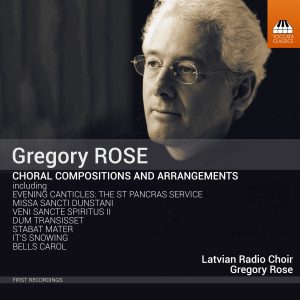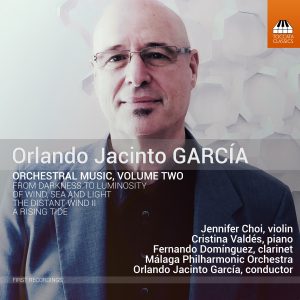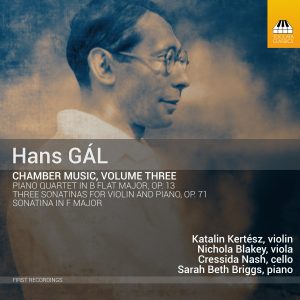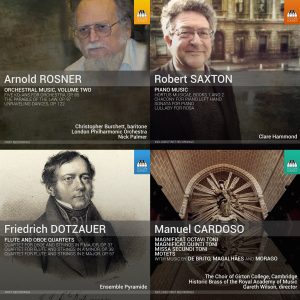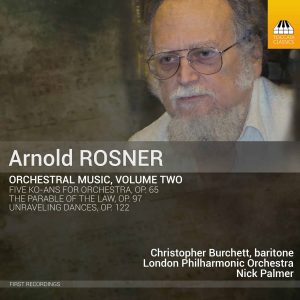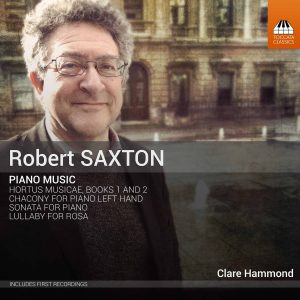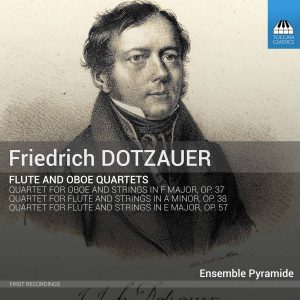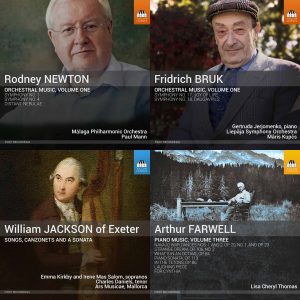Search Results for "Space Wolf: The First Omnibus mp3 torrent" – Page 58
William Wordsworth: Orchestral Music, Volume One
The music of London-born William Wordsworth (1908–88) – a great-great-grandson of the poet’s brother Christopher – lies downstream from that of Vaughan Williams and Sibelius. Like that of his contemporary Edmund Rubbra, Wordsworth’s music unfolds spontaneously, as a natural process, with a sense of grandeur perhaps enhanced by his move to the Scottish Highlands in 1961. Three of the four works recorded here display the sober dignity of the instinctive symphonist; the Variations on a Scottish Theme reveal a sly sense of humour behind the serious countenance.
Liepāja Symphony Orchestra
John Gibbons, conductor
Heino Eller: Complete Piano Music, Volume Six
The piano music of the Estonian composer Heino Eller (1887–1970), a total of 206 works, is not only the largest part of his output: it is also the largest body of works in Estonian classical music. But most of these pieces are unknown, even though the best of them are original contributions to the piano repertoire of the twentieth century, with Eller’s sensitive lyricism underpinned by gentle humour and an occasional epic tone. Volume Six in this series of nine recordings brings over a half-century of music, from 1910 to 1965, including the melodious Sonatina in G minor, the spirited Piano Music in Folk Tone and the exquisite La fille du nord.
Sten Lassmann, piano
Alexandre Boëly: Piano Music, Volume One
Alexandre Boëly (1785–1858) is best remembered as a member of the long French tradition of organist-composers. His piano music, by contrast, is as good as unknown, and yet it is an important link between the Baroque and Classical worlds of eighteenth-century France and the emerging Romanticism of the nineteenth. This recording, on an Érard piano from 1853, highlights both its Classical poise and its Romantic charm, revealing Boëly as a forerunner of composers like Saint-Saëns, whom he taught, as well as other piano pioneers such as Alkan, Chopin and Liszt, all of whom this prominent Parisian musician and teacher may well have known personally.
Stephanie McCallum, piano (Érard, Paris, 1853)
May 2018 Bundle
Included in this bundle:
April 2018 Bundle
Included in this bundle:
Jeremy Dale Roberts: Chamber and Instrumental Music
Jeremy Dale Roberts (1934–2017) was a unique figure on the British musical landscape: as a composer, he steered a path between traditional tonality and modernism, developing a language that can range from aching, pastoral lyricism to wild, freewheeling energy. This album – to which Dale Roberts referred as ‘a kind of testament’ – counterpoints works from the beginning and end of his career, all distinguished by his unmistakable sense of drama and poetry and his peerless technical command. The performers here worked intensely with the composer over a number of years, and he was involved with every aspect of these recordings, from initial rehearsals up to the final edits.
Peter Sheppard Skærved, violin (Track 1)
Roderick Chadwick, piano (Tracks 1 – 2)
Bridget MacRae, cello (Tracks 3 – 6)
Kreutzer Quartet (Tracks 3 – 6)
Peter Sheppard Skærved, Mihailo Tranda lovski, violins
Morgan Goff, viola
Neil Heyde, cello
Solomon Rosowsky: Chamber Music and Yiddish Songs
This fourth album in the Toccata ‘Russian Jewish Classics’ series is devoted to one of the founding members of the influential Society for Jewish Folk Music in St Petersburg, Solomon Rosowsky (1878–1962). The son of a prominent cantor, Rosowsky was an eminent scholar of synagogue chant in his own right, but his instrumental and vocal chamber music reveals much wider influences, ancient and modern. From a whirling showpiece for piano trio via tender lullabies to the Mediterranean desert evoked in the Biblical drama Jacob and Rachel, Rosowsky’s music embraces the rich and varied heritage of the Jewish people.
Musicians of the Pittsburgh Jewish Music Festival
Sari Gruber, soprano (Track 10)
Rachel Calloway, mezzo-soprano (Tracks 4 – 6, 14)
Igor Raykhelson: Piano and Chamber Music, Volume One
In his early days the composer-pianist Igor Raykhelson – born in Leningrad in 1961, once a New York resident and now based in Moscow – studied both classical and jazz piano. Those influences have combined to create a uniquely personal, Rachmaninov- plays-the-blues Neo-Romantic style: not only is Raykhelson unafraid to write a good tune – it’s clear right away whose tune it is. And in his chamber and instrumental works, the intimate, parlando manner that Raykhelson absorbed from jazz becomes particularly effective.
Borodin Quartet
Ekaterina Astashova, violin (Tracks 1 – 2)
Alexander Kniazev, cello (Track 1)
Konstantin Lifschitz, piano (Track 1 – 9)
Gregory Rose: Choral Compositions and Arrangements
Gregory Rose (b. 1948) absorbed the English choral tradition from his father, the Oxford conductor and composer Bernard Rose, expanding that inheritance with the techniques of European and American modernism, acquired in part during his own conducting career. This conspectus of over four decades of choral music presents a vivid combination of original compositions and agreeable arrangements, sung here with exultant virtuosity by one of Europe’s leading choirs, conducted by Gregory Rose himself.
Latvian Radio Choir
Gregory Rose, conductor
Orlando Jacinto García: Orchestral Music, Volume Two
Born in Havana in 1954, the Miami-based Orlando Jacinto García studied with Morton Feldman and has inherited some of Feldman’s concerns: his music likewise evolves gradually over slow-moving spans of time – here and there with an echo of West Coast minimalism. Like the still surface of the sea, the works on this album (three of them concertante pieces for virtuoso soloists) mirror the unhurried movement of natural phenomena, often in textures of considerable delicacy – and occasionally hinting at larger forces behind the apparent stasis.
Jennifer Choi, violin (track 1)
Cristina Valdés, piano (track 2)
Fernando Domínguez, clarinet (track 3)
Málaga Philharmonic Orchestra
Orlando Jacinto García, conductor
Hans Gál: Chamber Music, Volume Three
These five works, from three different stages of Hans Gál’s long life (1890–1987), all show his consummate craftsmanship but are otherwise quite different in character. The passionate Piano Quartet (1914), downstream from Brahms and Dvořák, brings the grand gestures of Romanticism into the early twentieth century. The 1935 Sonatina in F major for violin and piano, recently rediscovered, and the three Sonatinas from 1956 put a premium on textural clarity and lyrical approachability; here the contrapuntal ingenuity, ceaseless thematic development, harmonic freedom and rhythmic unpredictability of Gál’s language animate the music from within.
Katalin Kertész, violin
Nichola Blakey, (viola 1 – 4)
Cressida Nash, (cello 1 – 4)
Sarah Beth Briggs, piano
March 2018 Bundle
Included in this bundle:
Arnold Rosner: Orchestral Music, Volume Two
The musical language of the New York-based Arnold Rosner (1945–2013) clothes the modal harmony and rhythm of pre-Baroque polyphony in rich Romantic colours, producing a style that is instantly recognisable and immediately appealing. This second Toccata Classics album of his orchestral music contrasts the high-spirited Unraveling Dances – a rhapsody with more than a nod to Ravel’s Bolero – with the powerful symphonic suite Five Ko-ans for Orchestra and Rosner’s dramatic, dark, hieratic setting of Kafka’s The Parable of the Law for baritone and orchestra.
London Philharmonic Orchestra
Nick Palmer, conductor
Christopher Burchett, baritone (Track 7)
Robert Saxton: Piano Music
In its bell-like sonorities, clear textures and ritual manner, the piano music of Robert Saxton (born in London in 1953) suggests an almost oriental fascination with light and the way light refracts and diffracts – and yet it is audibly music written by an Englishman. In the two Books of Saxton’s Hortus Musicae in particular, this fascinating confluence generates a soundworld somewhere downstream from Takemitsu and Tippett, giving these gardens of music both a ceremonial dignity and sense of spring growth.
Clare Hammond, piano
Friedrich Dotzauer: Flute and Oboe Quartets
The cellist-composer Justus Johann Friedrich Dotzauer (1783–1860), an orchestral musician in Dresden and Leipzig as well as an important soloist and teacher, is best remembered for the music he wrote for his own instrument: the studies of his Violoncellschule are still in use today. But the prolific Dotzauer wrote much else, and his generous output of chamber music includes a handful of good-natured quartets for solo wind instruments and strings. They share an elegant late-Classical manner, with echoes of Mozart and Haydn, but their poise and charm can disguise fearsome technical demands and occasional harmonic boldness.
MIT DEUTSCHEM KOMMENTAR
Ensemble Pyramide
Markus Brönnimann, flute (Tracks 1–4)
Barbara Tillmann, oboe (Tracks 5 – 8)
Ulrike Jacoby, violin
Muriel Schweizer, viola
Anita Jehli, cello
Stay In the Know
JOIN THE TOCCATA NEWSLETTER
"*" indicates required fields
By visiting our site, you agree to our privacy policy regarding cookies, tracking statistics, etc.
